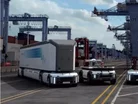Vision 2040: Hyundai's Mission Popularise Hydrogen by 2040

Popularising Hydrogen by 2040 Through New TEchnologies and Mobility Solutions
Presenting its plans to popularise hydrogen by 2040 at the Hydrogen Wave global online forum, Hyundai Motor Group is committed to clean sustainable energy for all types of mobility.
At the forum, the group unveiled its plan to electrify all new commercial vehicle models by 2028, which will feature fuel cell electric or battery-electric powertrains, and fuel cell systems applications.
Hyundai’s latest strategy will put the group at the forefront of the commercial vehicle sector, becoming the first global automaker to realise such ambitions for commercial vehicle transportation, helping to reshape the industry and realise a sustainable future.
“Hyundai Motor Group’s vision is to apply hydrogen energy in all areas of life and industry such as our homes, workplaces and factories. The goal is to make hydrogen readily used for everyone, everything, and everywhere. We want to offer practical solutions for the sustainable development of humanity and with these breakthroughs, we aim to help foster a worldwide Hydrogen Society by 2040,” said Euisun Chung, Chairman, Hyundai Motor Group.
Development of the first FCEV
Developing its first FCEV in 1998, the group has been preparing for the future of hydrogen ever since. In 2013, the group introduced the Tuscon FCEV which opened the doors for mass production of the FCEVs. In 2018, Hyundai launched the next-generation fuel-cell SUV, NEXO, and in 2020 the world’s first heavy-duty fuel cell truck, XCIENT.
Backing Hydrogen
The group is backing hydrogen and its role in building a sustainable future and reducing the dependence on fossil fuels. After two decades of being at the forefront of this technology, the group will be expanding its technologies for wider application including additional mobility solutions and various energy utilisation.
Next-Generation Fuel Cell Systems
An ongoing process for Hyundai for many years, the group strives to reduce the cost of fuel cell systems for mass application. The group has made significant leaps in research and development (R&D) in this field.
During the Hydrogen Wave, Hyundai precedent a range of new fuel cell systems including a new prototype of its Third-Generation Fuel Cell Stack with higher power than the NEXO system.
Other fuel cell solutions include Trailer Drone a hydrogen-powered container transportation system capable of operating fully autonomously, and Fuel Cell e-Bogie a fully enclosed system with fuel cell propulsion and fully independent four-wheel driving.
In addition to this, Hyundai is trailing other mobility solutions including Vision FK a concept hydrogen-powered hybrid sports car, Rescue Drone a new concept mobility solution to create a flying drone that can be operated remotely and autonomously for critical operations, H Moving Station a heavy-duty vehicle equipped with charging facilities for FCEVs, and RHGV (Rescue Hydrogen Generator Vehicle) that supplies power to vehicles in aid of urgent assistance in remote, off-road areas.
“The degree and frequency of environmental disasters is rising fast and we now face a code red warning for humanity. The Group seeks to offer powerful and pragmatic solutions for combatting climate change via the tremendous potential of hydrogen energy,” said Chung.



